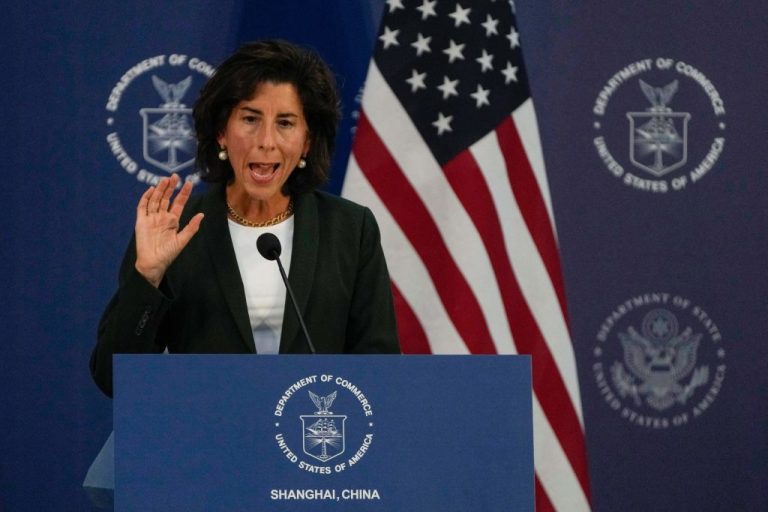On Aug. 29, U.S. Commerce Secretary Gina Raimondo unveiled that she declined a request from Chinese leaders to ease export controls on technology that may have military applications. Despite the tensions, however, both nations are committed to discussing issues related to trade secret protection, AP News reported.
As part of a diplomatic effort to mend tense relations, Raimondo visited Beijing, where she discussed concerns with China’s second top leader, Premier Li Qiang. The meeting zeroed in on the nation’s restrictions on U.S. tech companies, while Raimondo highlighted the challenging environment for foreign firms due to China’s expanded anti-spying regulations and unexpected raids on consulting entities.
This follows a series of visits by American officials, including Treasury Secretary Janet Yellen, to rebuild diplomatic relations strained by issues related to technology, security, and Taiwan.
- Yellen’s China Visit Fails to ‘Stabilize the Relationship’
- China Increases Military Pressure on Taiwan With New Show of Navy Ships and Jets
Breaking the ice
China has been vocal about its concerns regarding restricted access to U.S. technology, especially processor chips. Such limitations hinder the Chinese Communist Party’s (CCP) aspirations in areas like artificial intelligence and advanced robotics, said Li.
Notably, these curbs severely impacted leading Chinese tech companies like Huawei Technologies Ltd., China’s foremost global tech brand, and Tencent, a multinational conglomerate specializing in various internet-related services and products, including social media, entertainment, artificial intelligence, and advertising.
Success
You are now signed up for our newsletter
Success
Check your email to complete sign up
RELATED: Alibaba and Tencent Stocks Plunge After Latest Fines
During the meeting, Chinese leaders expressed their desire to see a reduction in technology export controls, especially those with potential military applications. They also sought a retraction of President Joe Biden’s order limiting U.S. investments in Chinese firms with potential military ties.
“We don’t negotiate on matters of national security,” Raimondo clapped back with. However, the two governments have agreed to share details about U.S. export controls in hopes of fostering better compliance and opening new lines of communication.
Premier Li emphasized the importance of “concrete actions” from the U.S. to enhance bilateral ties. A meeting that was initially intended to be a brief 10-minute courtesy call extended to an hour and 15 minutes, AP News reported.
Seeking transparency
Despite economic challenges in China, Raimondo sensed that her Chinese counterparts were not primarily driven by the downturn during their discussions.
“Their asks were to reduce export controls on technology with possible military uses and to retract an order by President Joe Biden that restricts U.S. investment in Chinese companies that might be involved in military development,” Raimondo said.
U.S.-China dialogues on military, climate, and other topics were halted after then-Speaker Nancy Pelosi’s visit to Taiwan in August 2022. Though Taiwan (officially known as the Republic of China) is an independent island nation with its own de facto government, Beijing claims it as a rightful part of its territory, and has vowed to reclaim it by any means necessary.
Conditions for foreign firms in China have also deteriorated due to the expansion of an anti-spying law, Raimond noted. Recent instances, such as the Mintz Group being fined for improper data collection, underscore the challenges faced by international companies in China as it attempts to jumpstart a sputtering national economy.
RELATED: As China’s Finances Worsen, Thug-like Local Governments Impose a ‘Fines Economy’
Raimondo stressed the need for clarity from China about the “seemingly random and unpredictable” constraints on U.S. tech firms. Raimondo illustrated an example when Beijing halted the use of products from leading American memory chip manufacturer, Micron Inc., after it failed a security assessment.
Though the meetings were characterized by open dialogue, Raimondo remained cautiously optimistic, noting that the meeting could signal a turning point towards constructive action in their relationship.
“We had a lot of candid dialogue,” she said. “I hope this becomes a moment where we start to see action.”
However, there’s no clarity yet on whether Beijing will modify its policies that have strained its ties with both the U.S. and its European and Asian neighbors, Raimondo pointed out.
Plans for future engagement
The ongoing visits between China and the U.S. stem from a meeting agreement between Presidents Xi and Biden in November 2022. Raimondo also engaged in discussions with Vice Premier He Lifeng, who oversees economic relations with the U.S. Their talks were promising, with an emphasis on mutual cooperation, official U.S. reports noted.
While addressing the Biden administration’s strategy of “de-risking”, Raimondo clarified that while the U.S. prioritizes national security, it does not intend to isolate China or hamper its growth.
Raimondo also noted that officials from both countries will reconvene during a “travel and tourism summit” in 2024 that aims to revive tourism once antivirus controls in China are fully lifted. This includes the resumption of large Chinese tour groups visiting the U.S.















